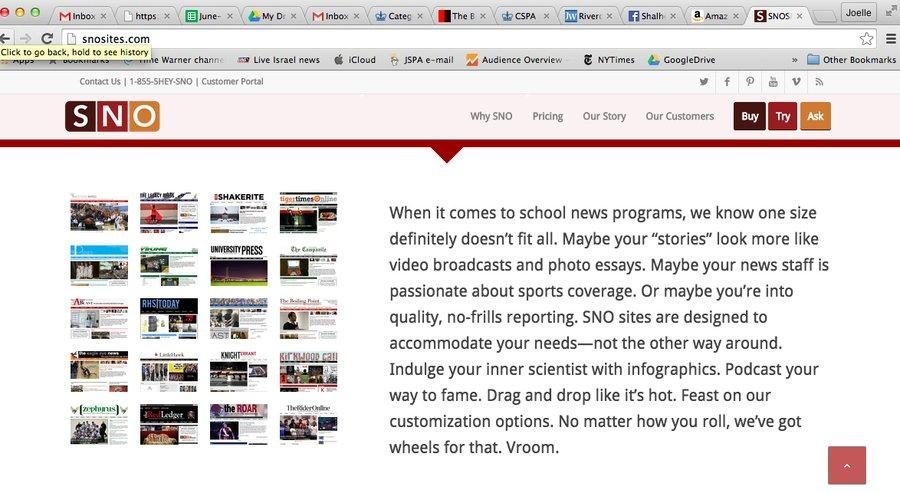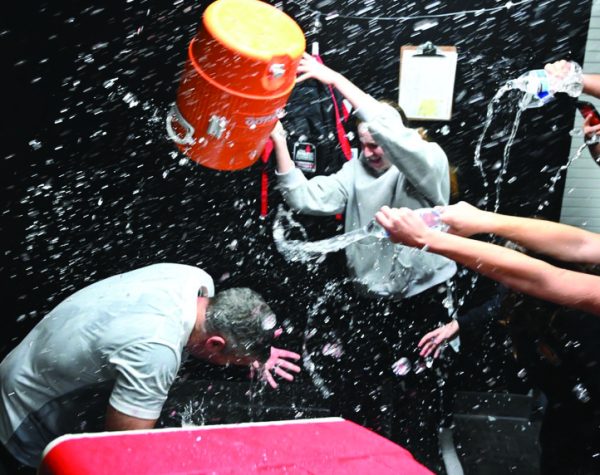‘Denial of Service’ attacks briefly sideline BP website
June 24, 2015
By Will Kasdan, Staff Writer
On Tuesday, May 26, at 2 p.m., Boiling Point editors received notice from their website provider that shalhevetboilingpoint.com was the victim of a “DDoS attack” and would be offline until the attack subsided or was repelled.
Editors posted the information on the website’s Facebook page, saying: “Boiling Point server is down due to a DDoS attack. We apologize for the inconvenience and will let you know when it is back up.“
As a cyber-force attacked the Boiling Point’s website, its server remained unusable.
The website was back up by dinnertime, thanks to a quick response by the website’s host. But when it started, editors were told it might last as long as 18 hours.
“That would have been a big deal,” said faculty adviser Mrs. Joelle Keene, “because when people try to find your site and are told it doesn’t exist, they may not try again. So not only are they not getting the news when they want it, but they may stop looking for it at your address.”
DDoS stands for Distributed Denial of Service, which means a website is deliberately flooded with an extremely huge number of requests, causing a server time out.
While the source of the DDoS is still unknown, it’s likely that it came from a foreign country, like the majority of DDoS initiators. And just like any other cyber-hacking incident, the reasoning behind it is unknown.
Mrs. Keene said it was the second time it had happened to the Boiling Point, the first one having taken place in January.
“It’s mostly a nuisance, but it’s helpful if people know it can happen,” she said. “Obviously we’re not the only victims. This is a fact of internet life now, and so people should know if they get a message like that, it might always be something really temporary.”
Mr. Yossie Frankel, Shalhevet’s director of technology, explained how it works.
“The server sits on the Internet with a limited amount of bandwidth,” said Mr. Frankel.”In milliseconds, there is a giant influx of information that the server can’t handle.”
He said hackers charge about $150 to mount a weeklong DDoS attack, using a network of computers that they have infected with a virus. It’s called a “botnet,” a robotic network of computers.
“Hackers can command computers, and then create a botnet,” Mr. Frankel said. “At any given moment, they tell the bots to attack an IP address.”
The hacker is similar to an officer controlling his troops.
“The bigger the net, the bigger the attack,” said Mr. Frankel.
According to cybersecurity experts and threat reports, such hackers are responsible for 2,000 daily DDoS attacks on servers worldwide, and 33 percent of all website downtime incidents.
The Boiling Point’s website is hosted by a company called School Newspapers Online, or SNO, which hosts more than 1,900 school websites around the world.
“It’s the server farm that is under attack, not our website,” said Mr. Frankel.
SNO co-founder Jason Wallestad wrote to The Boiling Point to explain what was going on.
“People start these types of attacks for any number of reasons,” Mr. Wallestad said in an e-mail. An attacker can target a site because someone doesn’t like it or finds it offensive, or just because of being bored and having nothing better to do, he said.
Shalhevet sophomore and tech enthusiast Ephraim Drucker said not all sites are equally vulnerable.
“Some servers are more secure than others,” said Ephraim. “This is due to the provider giving the website’s owner a certain amount of occupancy on the website at one time.”
For an example, he explained, just as you can’t fit 500 people into a room with a 300-person maximum occupancy while a bigger room would be able to hold more people, more website space withstands larger DDoS attacks.
“Penetration hackers send a bunch of empty users and fill up the occupancy, which doesn’t allow anyone but them on the site,” Ephraim said.
Even though she is concerned about an attack similar to the DDoS happening in the future, Mrs. Keene points out that SNO resolves things quickly and handled the most recent situation with aplomb.
“We’re just a high school news site,” says Keene, “but they treat us like the New York Times, they took it very seriously.”
Most weeks, the Boiling Point gets about 800 hits, but 2,000 is not uncommon, according to Google Analytics reports. In January 2014 it received 24,000 hits in three days after reporting that SAR Academy in Riverdale, N.Y., was allowing girls to wear tefillin.













